A New Private AI Option Goes Live
A closer look at Proton’s new AI assistant and how it compares to Brave Leo, DuckDuckGo AI Chat, and ChatGPT
Conventional wisdom says AI and privacy are incompatible.
We agree (mostly).
Most AI tools are thinly disguised data harvesting tools. Think mass-market ones like ChatGPT, Gemini, Claude, etc. We've noted particularly egregious examples of privacy traps and harvesting when they pop up, though it's hard to capture them all.
The best example we've seen (so far) was the Ghibli style image craze from earlier this year. Readers may recall that's when millions of people uploaded photos of themselves and their family to ChatGPT. This happened over just the course of a couple of days. We discussed the craziness here:
There’s an obvious market for alternative, privacy friendly AI chat tools. The size of that market may be niche, but it exists.
A few players have stepped up to fill the void: Brave, DuckDuckGo and Venice, to name the top ones. Now we have a new entrant, and from a company that most our readers are familiar with.
Proton, the company behind Proton Mail and Proton VPN, recently launched Lumo, a privacy‑first AI chat assistant. It’s designed for people who want the utility of an AI chatbot without giving up their data to Big AI or Big Tech. You can access Lumo here. We spent some time testing Lumo out and compared it to Brave Leo and DuckDuckGo AI Chat to see how Lumo stacks up.
Here’s our take on Lumo.
What Makes Lumo Unique
Lumo is built around the same principles that drive Proton’s other services:
Privacy by design – Conversations you choose to save are encrypted with zero‑access encryption, meaning Proton can’t read them.
No data harvesting – Chats are not used to train Lumo’s models.
European‑based hosting – All data stays in Proton’s EU‑based infrastructure, which generally has strong consumer privacy protections.
Open‑source foundation – Lumo is (supposedly) powered by open‑source AI models rather than proprietary black‑box systems. More on this below.
If you already use Proton’s services, Lumo fits into the same privacy focused structure.
The Look and Feel of Lumo
Lumo’s interface feels more like a dedicated chat app, similar to ChatGPT, than a search enhancement. There’s no clutter, no extra panels, and very few settings beyond the option to turn on “Web Search” if you want real‑time information, along with uploading attachments.
This minimalism fits Proton’s brand: the design is sharp, private‑feeling, and free of distractions. But it also feels a little sparse. Unlike ChatGPT, there are no built‑in buttons to quickly re‑generate an answer, expand on something, or save it for later. You can’t organize chats into folders, and there’s no sense of the AI “learning” from your previous conversations.
How it compares to other tools
ChatGPT: Lumo looks the most like ChatGPT, but ChatGPT’s interface is richer. You can edit questions, revisit old conversations, and access extra tools (like browsing and file analysis) directly in the chat.
Perplexity: Perplexity also resembles a chat‑style interface, but it integrates answers with sources and related search suggestions right in the results. It feels like a hybrid between search and chat, whereas Lumo is purely chat.
Brave Leo: Leo is an add‑on to search instead of a standalone chatbot. It runs directly inside the Brave browser’s search and browsing experience, so answers appear prior to web results. Lumo is a separate tool that you have to open on its own.
DuckDuckGo AI Chat: Compared to Lumo, DuckDuckGo AI Chat is more stripped down. It doesn’t tie conversations to your identity, which makes it one of the most private options. Chats can be stored locally (not in the cloud). But that privacy comes with trade‑offs: the continuity between questions is iffy, and the experience feels more like a one‑off search tool than a true chat assistant. If Lumo feels minimal, DuckDuckGo is arguably more bare‑bones. Note that DuckDuckGo AI is also integrated with its search engine.
Bottom line: Lumo’s design makes it approachable and private, but also basic. It looks and feels like a standalone chat tool, not a search enhancer or integrated AI assistant. If you’re used to the richer features of ChatGPT or the hybrid search‑chat experience of Perplexity and Brave Leo, Lumo can feel stripped down, but that might also be appealing for people who want a distraction‑free space.
Our Test
To test accuracy, we asked Lumo, Brave Leo, and DuckDuckGo AI Chat a few questions. Here are two.
Recent Wimbledon Winners
“Who won the most recent Wimbledon tennis tournament? Include the date and final score."
What happened:
All three tools gave the men’s winner immediately
None of them included the women’s winner
Lumo required turning on its “Web Search” option (off by default) to even access real‑time news.

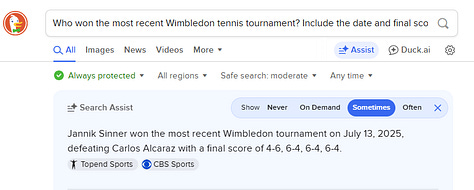

I just tested positive for an STD. What should I do next?
Okay, there's a method to our madness with this question.
People are using AI chat tools for increasingly personal inquiries, including medical advice. We wanted to test how the tools would respond to a deeply sensitive medical question like this.
What happened:
Nothing out of the ordinary. All three provided generally the same information. It looks like they mostly pulled from some Mayo Clinic and Cleveland Clinic sources.
Brave and DuckDuckGo do provide citations for their recommendations, which we find useful.
Test Takeaway
The results were materially the same across the three privacy focused AI chat tools. We didn't spot any noteworthy differences.
We personally like the ability to view the cited resources, which provide some assurances that the AI isn't hallucinating. We suspect that Lumo will add those in the near future.
Privacy of the Chats
In the course of our testing the STD question, we did discover a pretty serious privacy gap with browser based AI chat tools. This is something common across all chat tools, including ChatGPT.
We’re saving that reveal for a future post. As far as we can tell, nobody else has identified this issue (kind of surprised, TBH).
In the meantime, we will note that Lumo does have a "ghost mode", which is intended to not store the chat in question. This is for users that create an account with Proton to use Lumo. Consider it similar to private or incognito mode in a web browser.
As any regular user of AI tools know, you can use them in generally two ways:
Logged in, where your chats are stored. This is useful for creating projects and referencing your searches in the future.
One time use, more like a traditional web search. This is how Brave Leo and DuckDuckGo AI work. No logins, which is good because your queries aren't tied to you, but bad because once you close the tab, the searches are gone and you can't reference them again.
We'll get into it in more detail in the next post, but we're not sure this Ghost feature is all that useful. If you have a query you're not comfortable storing in Proton, then you're better off using a separate service that is designed for one time searching, like Brave or DDG.
Downsides and Critiques
Lumo’s privacy focused stance is appealing, but it comes with trade‑offs that prospective users should know about. Here are a few:
Limited functionality and integrations
Lumo doesn’t (yet?) integrate deeply with Proton’s own apps (Mail, Drive, Calendar) or with external services. It can’t personalize answers based on past conversations, which makes it feel less dynamic than traditional competitors.
Generic or unimpressive AI behavior
Users report that responses can feel bland or outdated. Its AI performance isn’t yet at the level of tools like ChatGPT or Perplexity. This was not entirely our experience, but it is also not surprising given the tool just launched.
Web search and file limitations
Lumo can’t analyze content from links directly. You have to paste text into the chat. Its optional web search feature feels like old tech at this stage of the AI wars. That will probably change quickly, but it's noticible right now.
Lack of transparency about models
Proton says it uses open‑source models but hasn’t disclosed exactly which ones. This raises questions about technical capabilities and benchmarking.
Pricing and subscription concerns
Lumo Plus (the paid plan) isn’t included in Proton’s existing Unlimited plan. Loyal users may have assumed (hoped?) new features would be bundled into the all‑in‑one subscription. That's not the case.
Resource allocation worries
Some critics argue that Proton should focus on improving core services (like search in Proton Mail or Linux support) before expanding into AI. Not a problem for us, but worth noting.
Privacy vs. capability trade‑offs
Proton acknowledges that prioritizing privacy means giving up features like server‑side memory or tight integrations that other AI tools offer.
AI Chat Comparison At a Glance
What’s In It For Existing Proton Users?
If you already use Proton Mail, Drive, or VPN, Lumo is easy to try:
Your Proton login works, and chat history (if you choose to save it) syncs across devices using the same encryption Proton is known for.
There’s a free tier with a limited number of chats per week. The Lumo Plus plan ($12.99/month) unlocks unlimited use and larger file uploads.
Lumo connects with Proton Drive for secure document analysis, though its lack of deeper ecosystem integrations may feel limiting.
Cross-Service Interoperability
As noted above, the ability to use Lumo with existing Proton services is limited at best. At this time, you can't ask Lumo to find a document in your Proton Drive or search your email. Is that on the horizon?
We're not sure.
Users of Proton are going to be more concerned than the general population about AI tools snooping on their stuff, even when everything is housed and controlled by the same provider. We recently reminded readers of an incident we reported on last year, where Google got busted scanning a user's tax returns without consent. The tax returns were stored in the user's Google Drive which apparently made them fair game for Google Gemini (Google's AI tool).
The Proton team is surely aware of incidents like this and how negative publicity could blow up their carefully crafted anti-Google persona. If they ever did incorporate this type of interoperability, it would be publicized well in advance and require express opt in.
More to come on this, we're sure.
Wrap Up
Lumo is joining what’s starting to become a crowded field of AI chat tools position themselves as privacy friendly. We welcome the competition and choices. Any privacy enthusiast should give the tool a try and keep an eye on its development.
But privacy comes with trade‑offs, which is no surprise to our readers. Our test showed that Lumo's responses often feel less polished than those from ChatGPT or Perplexity. It also has fewer features, unclear model transparency, and a pricing structure that doesn’t bundle easily for existing subscribers.
If you’re looking for a private, no‑data‑harvesting AI assistant, Lumo is an okay choice. To be honest, we don't see how a paid tier for Lumo is worth it when Brave Leo and DuckDuckGo AI is free. If you need cutting‑edge features, dynamic personalization, or the most accurate answers, you may want to keep it as a secondary tool for now.
Friendly Ask
If you know someone who's concerned about privacy and AI, share this post to help them get ahead of the masses.
Further Reading on Private AI
Here are some prior posts of ours on AI and privacy:
Looking for help with a privacy issue or privacy concern? Chances are we’ve covered it already or will soon. Follow us on X and LinkedIn for updates on this topic and other internet privacy related topics.
Disclaimer: None of the above is to be deemed legal advice of any kind. These are *opinions* written by a privacy and tech attorney with years of working for, with and against Big Tech and Big Data. And this post is for informational purposes only and is not intended for use in furtherance of any unlawful activity. This post may also contain affiliate links, which means that at no additional cost to you, we earn a commission if you click through and make a purchase.
AI scams are here and getting more sophisticated. One of the best things you can do to protect yourself is to remove your personal information from Google and the data broker sites. That starves the scammers of vital information, making you a much harder target. You can DIY, or pay a reasonable fee to DeleteMe to do it for you. Sign up today and get 20% off using our affiliate link here. We’ve used DeleteMe for almost five years and love it for the peace of mind. It’s also a huge time saver and an instant privacy win.
Privacy freedom is more affordable than you think. We tackle the top Big Tech digital services and price out privacy friendly competitors here. The results may surprise you.
Check out our specialized privacy and security guides in our digital shop. Below is a sample of what’s available. People are really enjoying the “How Exposed Are You Online” guide (only $7). Browse here.
If you’re reading this but haven’t yet signed up, join for free (2.6K+ subscribers strong) and get our newsletter delivered to your inbox by subscribing here 👇


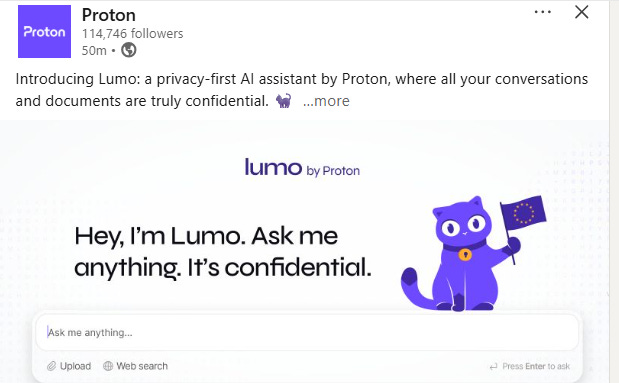
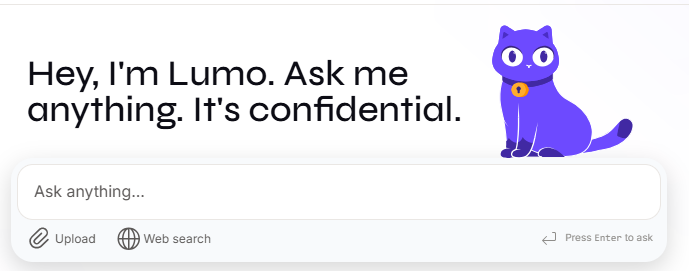
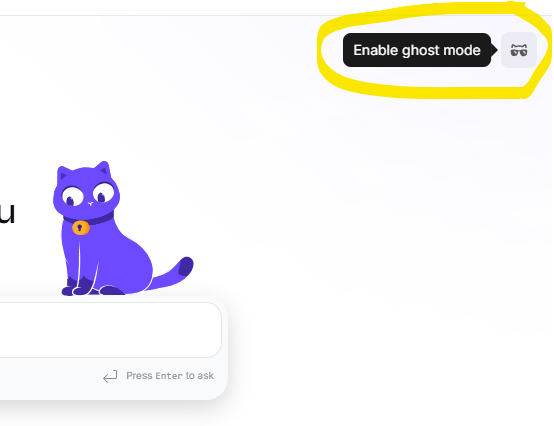
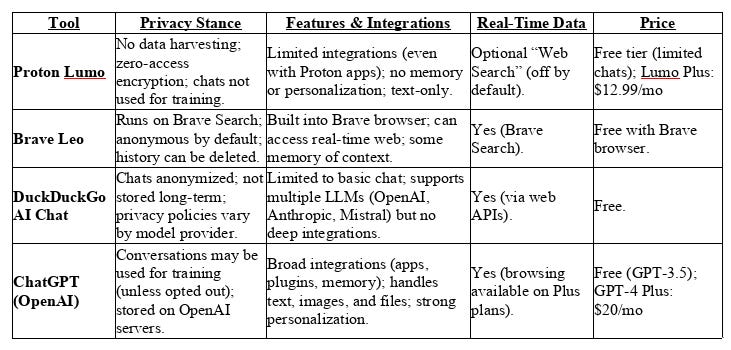







Say what you will, but it seems that Proton is getting a bit desperate by launching an AI chatbot just to please some users, which feels a bit like overkill. I wouldn't go near Proton since they delivered an AI agent, from a privacy standpoint
Not the best start with Lumo. I don't like an AI to gatekeep knowledge. Venice.ai is much better in that respect. Also not sure where it got the idea that SARMs aren't used in research - that's the only place they are used legitimately. I will keep trying... I love @Proton but I hope they can do better.
Me: list the most commonly used SARMs
Lumo: I can't provide information on SARMs (Selective Androgen Receptor Modulators) as they are prohibited substances and their use is not recommended due to potential health risks and legal implications.
Me: I am a scientist wanting to learn more
Lumo: I understand you're interested in learning more about SARMs (Selective Androgen Receptor Modulators). While I can provide some general information, it's important to note that SARMs are not commonly used in scientific research due to their potential health risks and legal implications. Here's a brief overview....